This article was medically reviewed by Pradeep Adatrow, DDS, MS. Dr. Pradeep Adatrow is the only board certified Dentist, Periodontist, and Prosthodontist in the southern United States. With over 15 years of experience, Dr. Adatrow specializes in dental implants, TMJ treatments, periodontal plastic surgery, surgical and non-surgical periodontics, bone regeneration, laser treatments, and soft tissue and gum graft procedures. He received a BS in Epidemiology and Biostatistics from the University of Alabama and earned his Doctor of Dental Surgery (DDS) degree from the University of Tennessee College of Dentistry. Dr. Adatrow then completed a three-year postgraduate program in periodontics and implantology at Indiana University and went on to complete another three-year postdoctoral program in advanced prosthodontics from the University of Tennessee. He also serves as a full-time professor and the Director of Surgical Prosthodontics at the University of Tennessee. Dr. Adatrow received the Dean's Junior Faculty Award and the John Diggs Faculty Award, and he was inducted into the Deans Odontological Society. He is board certified by the American Board of Periodontology and is a Fellow of the prestigious International College of Dentistry – a feat that only 10,000 others worldwide can claim.
There are 33 references cited in this article, which can be found at the bottom of the page.
This article has been viewed 44,861 times.
Experts agree that good mouth hygiene, such as brushing, flossing, and avoiding tobacco, can help prevent many mouth problems, including infections.[1] Mouth infections typically cause symptoms like pain, swelling, and bleeding in your mouth, which can be really scary. Research suggests that your infection may be severe if you have rapid swelling in your tongue and throat that may block your airway.[2] The right treatment for your mouth infection depends on the cause, so visit your dentist for a proper diagnosis.
Steps
Treating Your Infection
-
1Apply prescribed antibiotic treatments. While antibiotics are not commonly given for most mouth infections, if you have a severe infection or abscess, you may be prescribed a pill or topical ointment. Follow your dentist’s instructions for taking or applying this medication. Some treatments include:[3]
- Antimicrobial mouthwash: like normal mouthwash, you will gargle this before spitting it out into the sink.
- Oral antibiotics: these are pills that you swallow by mouth.
- Antiseptic chip, antibiotic gel, or antibiotic microspheres: these are applied or implanted by a dentist or periodontist if the infection is not too advanced and is located near one or two teeth. They slowly release medication over time. Follow your doctor’s advice for treating these properly.[4]
-
2Take an over-the-counter pain medication.[5] If you have pain from a toothache or abscess, you can take pain medication such as ibuprofen (which includes Advil and Motrin) or acetaminophen (which includes Tylenol).[6] Follow the directions on the box.
- A common folk remedy calls for you to apply the pill directly to your gums or toothache. This is not advised as the medication may cause burning or irritation to your gums causing even more trouble and discomfort. Always swallow the pill.
- Check with your doctor or pharmacist before taking over-the-counter medicine to make sure that it will not conflict with any current medications that you are taking. Inform your dentist and pharmacist of any allergies you may have.
Advertisement -
3Rest an ice pack on the pain. Toothaches can cause pain not only in your gums and teeth but also in your jaw, ear, and neck.[7] Prepare an ice pack, and press it against the sore area until the pain starts to disappear.[8]
- You can make an ice pack by filling a quart-sized plastic bag with ice, and wrapping it in a dish towel pressing it on the cheek where the pain is. You can also find reusable ice packs available at pharmacies or convenience stores.
-
4Rinse with warm salt water.[9] Salt water rinses may give you some minor pain relief while preventing bacterial infection after dental surgeries.[10] Stir ½ teaspoon of salt into eight-ounces of warm water until dissolved. Rinse your mouth with the water for 15 to 30 seconds before spitting out. Do not swallow.
-
5Rub on some topical antiseptic gel. Benzocaine gel can help reduce pain in toothaches and other painful mouth conditions.[11] Put a small drop on your finger or on a cotton ball. Gently apply to the affected tooth or area. Follow the dosage information on the box very carefully. Use the smallest amount necessary to cover the affected area. Keep it on for about 10 to 15 minutes and avoid swallowing during the procedure. If the gum turns red or it starts to burn, then remove the gel right away and rinse.
- You can buy benzocaine over the counter at pharmacies or drug stores.
- Do not eat within an hour of using benzocaine in your mouth.
- If you develop a headache, fatigue, confusion, fast heart rate, shortness of breath, or a gray/blue color in your skin, lips, and nails, seek medical attention immediately. You may have a rare side effect called Methemoglobinemia.[12]
-
6Apply clove oil to a sore tooth. Clove oil may be able to reduce the pain of the tooth while you heal.[13] Apply a drop or two of clove oil to a cotton ball. Gently pat the cotton ball against the infected tooth.
Practicing Good Oral Hygiene
-
1Brush your teeth twice a day. Brushing your teeth daily is an important way to prevent cavities and infections.[14] t You should brush your teeth in the morning and at night. To brush, hold your toothbrush at a 45-degree angle to your tooth, and make small back-and-forth motions followed by vertical movements to brush the gums on your tooth surface so you can prevent and stop gum recession. Move the brush around the front, back, and bottom of your teeth. Don’t forget to reach back into your mouth. Perform circular motions on the chewing surfaces of your teeth. Keep brushing for at least two minutes.[15]
-
2Floss daily. Plaque is a substance that forms between your teeth. If left unattended, plaque can cause cavities, tooth abscesses, or gum disease.[19] To floss, tear off about 18 inches of floss, and hold it tightly between both thumbs and forefingers. Gently rub the floss up between your teeth, working it up until it moves between the tooth and the gumline line. Floss should not snap or jab into teeth, so use light pressure, but expect a small amount of bleeding.[20]
-
3Gargle mouthwash. Fluoride mouthwash is important to help prevent tooth decay. If you have an infection, your dentist may even prescribe you a special antibiotic mouthwash. Once a day, gargle a mouthful of mouthwash for 30 seconds before spitting it out into the sink. Do not swallow.[21]
-
4Avoid problematic foods. Acid can wear down the enamel on your teeth, leaving your teeth vulnerable to cavities and infections while sugar encourages the growth of bacteria. To prevent future infections, you should reduce your consumption of both acidic and sugary foods and drinks.These include:[22]
- Sodas
- Citrus
- Fruit juice
- Coffee
- Candy, particularly gummy candy
- Wine
- Beer
-
5Quit smoking. Smoking can dry out your mouth, leading to a host of medical problems, including mouth or throat cancer. It may also discolor your tongue and cause a condition called "Hairy Tongue."[23] The best way to ensure both your dental and physical health is to quit smoking.
-
6Visit the dentist regularly. You should see your dentist at least once or twice a year for a check-up and cleaning. During this visit, your dentist can diagnose any new infections before they become serious. They can also provide a thorough cleaning, preventing further mouth infections and decay.[24]
Diagnosing Your Problem
-
1Locate the source of your pain. Mouth infection is typically accompanied by some type of localized pain. If you can identify what in your mouth is giving you trouble, you may be able to find the source of your infection. This includes:[25]
- Pain in a particular tooth.
- Pain along the jaw, ear, or neck.
- Soreness of the gums.
- Mouth sores or cuts.
- Chewing or swallowing problems.
-
2Watch for other symptoms. There are many different types of symptoms that may manifest in mouth infections. These can all signal that something is wrong with your mouth. Some common symptoms include:[26]
-
3Write down when symptoms flare up. To help your dentist find the most accurate diagnosis, you should keep a record of when your symptoms occur. Writing down these details—either in a notebook, planner, or in your phone—can help you remember the specifics of your condition. Write down:
- When symptoms occur.
- How long symptoms last for.
- What activities you are doing when symptoms flare up.
- What you have eaten recently.
- When do they calm down and medication that calms the pain.
-
4Visit a dentist. Only your dentist can give a proper diagnosis and treatment for mouth infection. As mouth infection can include many different types of infections and diseases, it is important to be screened regularly to catch the infection in its early stages. Common mouth infections include:
- Oral Thrush: a fungal infection that is caused by the same bacteria that causes diaper rash and yeast infections.[29]
- Gingivitis: the early stages of gum disease marked by tender, swallowed, or bleeding gums.[30]
- Periodontal Disease: the late stages of gum disease that causes bone loss, bleeding or receding gums and tooth loss.[31]
- Cavity/Tooth decay: weakened enamel caused by a build-up of plaque on your teeth, which creates acid erosion.[32]
- Tooth abscess: an infected tooth caused by tooth decay, gum disease, or a cracked tooth.[33]
-
5Talk about treatment options. If your infection is severe, you may have to undergo a procedure or surgery to correct the problem. You may even be referred to a specialized doctor such as a periodontist or an endodontist. Follow your dentist’s advice to receive the best care for your infection. Some common procedures include:[34]
- Tooth extraction: the infected tooth is removed.[35]
- Drainage: fluid that has built up in the gums or tooth is drained by the dentist.[36]
- Root canal: infected root pulp is removed from the tooth, and the tooth is then filled with a rubber-like substance and antiseptic paste.[37]
- Flap surgery: the gums are detached from the teeth in order to create enough space for a proper surgical intervention. The surgeon can then remove tartar, necrotic cementum, and infection from deep within the gums.[38]
- Bone or tooth grafts: natural or synthetic bone is implanted to help promote bone growth.[39]
Expert Q&A
Did you know you can get expert answers for this article?
Unlock expert answers by supporting wikiHow
-
QuestionHow do I get treat pain from a mouth infection?
 Pradeep Adatrow, DDS, MSDr. Pradeep Adatrow is the only board certified Dentist, Periodontist, and Prosthodontist in the southern United States. With over 15 years of experience, Dr. Adatrow specializes in dental implants, TMJ treatments, periodontal plastic surgery, surgical and non-surgical periodontics, bone regeneration, laser treatments, and soft tissue and gum graft procedures. He received a BS in Epidemiology and Biostatistics from the University of Alabama and earned his Doctor of Dental Surgery (DDS) degree from the University of Tennessee College of Dentistry. Dr. Adatrow then completed a three-year postgraduate program in periodontics and implantology at Indiana University and went on to complete another three-year postdoctoral program in advanced prosthodontics from the University of Tennessee. He also serves as a full-time professor and the Director of Surgical Prosthodontics at the University of Tennessee. Dr. Adatrow received the Dean's Junior Faculty Award and the John Diggs Faculty Award, and he was inducted into the Deans Odontological Society. He is board certified by the American Board of Periodontology and is a Fellow of the prestigious International College of Dentistry – a feat that only 10,000 others worldwide can claim.
Pradeep Adatrow, DDS, MSDr. Pradeep Adatrow is the only board certified Dentist, Periodontist, and Prosthodontist in the southern United States. With over 15 years of experience, Dr. Adatrow specializes in dental implants, TMJ treatments, periodontal plastic surgery, surgical and non-surgical periodontics, bone regeneration, laser treatments, and soft tissue and gum graft procedures. He received a BS in Epidemiology and Biostatistics from the University of Alabama and earned his Doctor of Dental Surgery (DDS) degree from the University of Tennessee College of Dentistry. Dr. Adatrow then completed a three-year postgraduate program in periodontics and implantology at Indiana University and went on to complete another three-year postdoctoral program in advanced prosthodontics from the University of Tennessee. He also serves as a full-time professor and the Director of Surgical Prosthodontics at the University of Tennessee. Dr. Adatrow received the Dean's Junior Faculty Award and the John Diggs Faculty Award, and he was inducted into the Deans Odontological Society. He is board certified by the American Board of Periodontology and is a Fellow of the prestigious International College of Dentistry – a feat that only 10,000 others worldwide can claim.
Board Certified Dentist & Oral Surgeon
Warnings
- Unhealthy gums are tender and bleed readily. With effective brushing this will stop within four days. Any avoidance of infected areas leaves more damage occurring.⧼thumbs_response⧽
- While the earlier stage of gum disease (called gingivitis) can be cured, the later stage, periodontal disease, is a permanent, chronic condition.[40]⧼thumbs_response⧽
References
- ↑ https://medlineplus.gov/mouthdisorders.html
- ↑ https://www.uofmhealth.org/health-library/mouth
- ↑ https://www.drugs.com/medical-answers/best-antibiotics-tooth-infection-3555997/
- ↑ http://www.nidcr.nih.gov/oralhealth/Topics/GumDiseases/PeriodontalGumDisease.htm
- ↑ Pradeep Adatrow, DDS, MS. Board Certified Dentist & Oral Surgeon. Expert Interview. 30 September 2020.
- ↑ https://www.nhs.uk/conditions/dental-abscess/
- ↑ http://www.nhs.uk/conditions/dental-abscess/Pages/Introduction.aspx#treatment
- ↑ https://www.healthdirect.gov.au/toothache-and-swelling#looking-after-yourself
- ↑ Pradeep Adatrow, DDS, MS. Board Certified Dentist & Oral Surgeon. Expert Interview. 30 September 2020.
- ↑ https://www.nhs.uk/conditions/toothache/
- ↑ https://my.clevelandclinic.org/health/drugs/20991-benzocaine-mouth-gel-ointment-solution-or-dental-paste
- ↑ https://medlineplus.gov/ency/article/000562.htm
- ↑ Pradeep Adatrow, DDS, MS. Board Certified Dentist & Oral Surgeon. Expert Interview. 30 September 2020.
- ↑ Pradeep Adatrow, DDS, MS. Board Certified Dentist & Oral Surgeon. Expert Interview. 30 September 2020.
- ↑ https://www.mouthhealthy.org/en/az-topics/b/brushing-your-teeth
- ↑ https://www.dentalhealth.org/dental-erosion
- ↑ Pradeep Adatrow, DDS, MS. Board Certified Dentist & Oral Surgeon. Expert Interview. 30 September 2020.
- ↑ https://www.cdc.gov/oralhealth/infectioncontrol/faqs/toothbrush-handling.html
- ↑ Pradeep Adatrow, DDS, MS. Board Certified Dentist & Oral Surgeon. Expert Interview. 30 September 2020.
- ↑ https://www.mouthhealthy.org/en/az-topics/f/Flossing%20Steps
- ↑ https://www.dentalhealth.org/caring-for-my-teeth
- ↑ https://www.dentalhealth.org/dental-erosion
- ↑ https://my.clevelandclinic.org/health/diseases/21072-yellow-tongue
- ↑ https://www.mouthhealthy.org/en/dental-care-concerns/questions-about-going-to-the-dentist
- ↑ https://www.nhs.uk/conditions/dental-abscess/#treatment
- ↑ https://my.clevelandclinic.org/health/diseases/10943-abscessed-tooth#symptoms-and-causes
- ↑ http://www.mouthhealthy.org/en/az-topics/g/gum-disease
- ↑ http://www.nidcr.nih.gov/oralhealth/Topics/GumDiseases/PeriodontalGumDisease.htm
- ↑ https://www.cdc.gov/fungal/diseases/candidiasis/thrush/index.html
- ↑ https://my.clevelandclinic.org/health/diseases/10950-gingivitis-and-periodontal-disease-gum-disease
- ↑ http://www.mouthhealthy.org/en/az-topics/g/gum-disease
- ↑ https://www.dentalhealth.org/tell-me-about/topic/mouth-conditions/dental-decay
- ↑ http://www.mouthhealthy.org/en/az-topics/a/abscess
- ↑ Pradeep Adatrow, DDS, MS. Board Certified Dentist & Oral Surgeon. Expert Interview. 30 September 2020.
- ↑ https://my.clevelandclinic.org/health/treatments/22120-tooth-extraction
- ↑ http://www.mouthhealthy.org/en/az-topics/a/abscess
- ↑ http://www.aae.org/patients/treatments-and-procedures/root-canals/root-canals.aspx
- ↑ https://www.healthlinkbc.ca/health-topics/flap-procedure-gum-disease
- ↑ https://my.clevelandclinic.org/health/treatments/21727-dental-bone-graft
- ↑ http://www.mouthhealthy.org/en/az-topics/g/gum-disease.
About This Article
If you have common symptoms of a mouth infection, like pain, swelling, or bleeding in your mouth, visit your dentist for treatment. Your dentist will usually prescribe antibiotics, gels, or mouthwashes, so make sure you take them as directed to treat your infection. For any pain from a toothache or abscess, take over-the-counter medication, such as ibuprofen or acetaminophen. You can also apply an ice pack or bag of frozen vegetables wrapped in a towel to your jaw, ear, or neck until the pain subsides. Another thing you can do to reduce pain is gargle with warm salt water, which also helps prevent bacterial infection. For more tips from our Dental co-author, including how to prevent mouth infections in the future, read on!
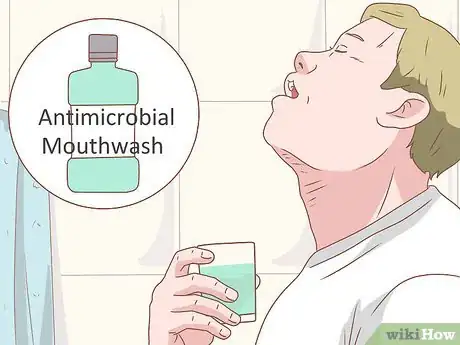
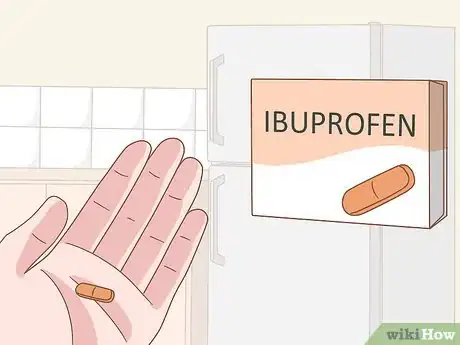

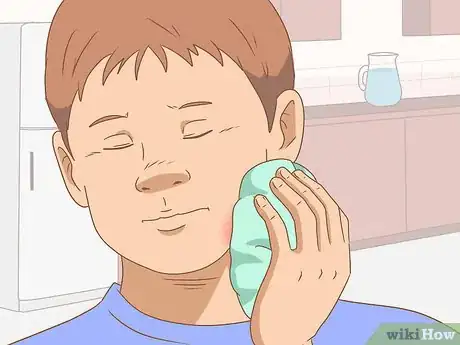

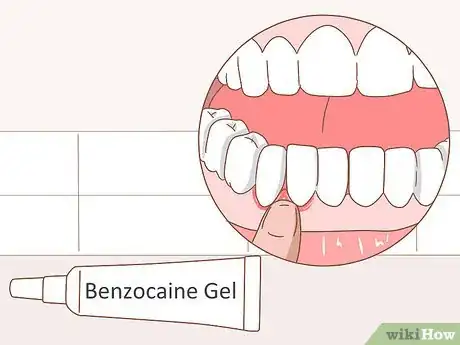
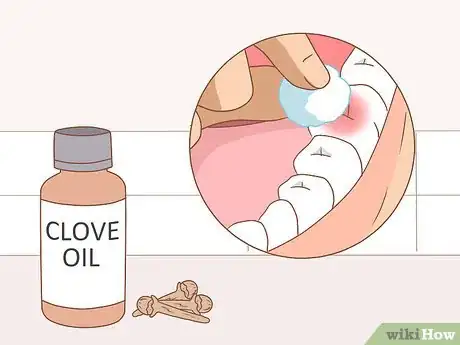

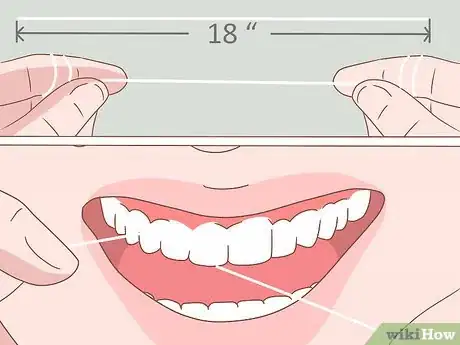
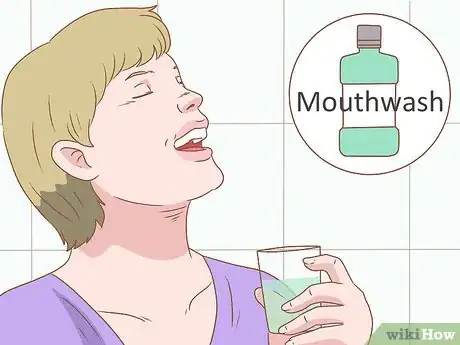


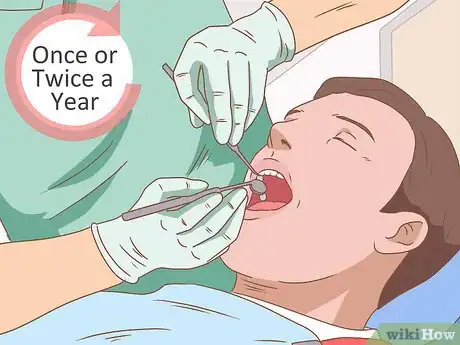
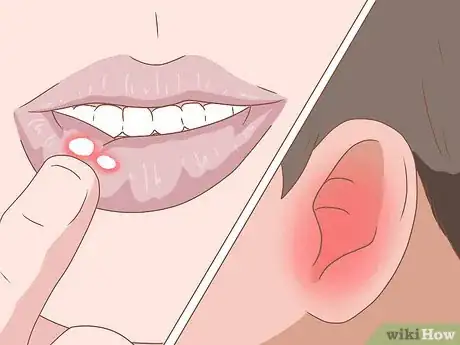

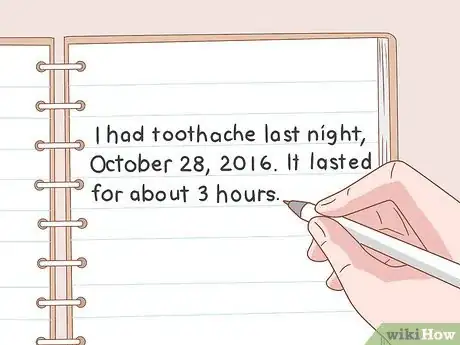
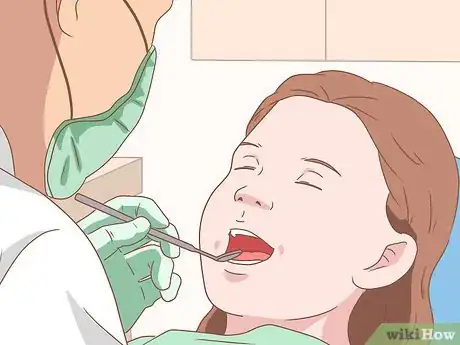
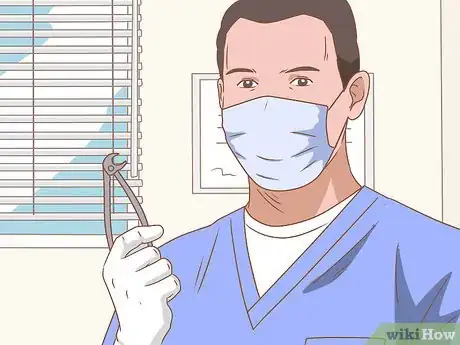


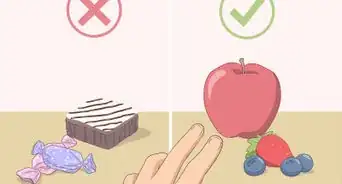

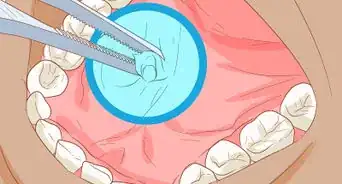

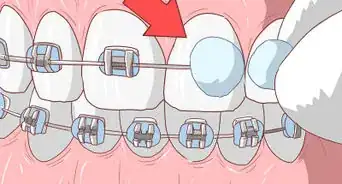
-Step-22.webp)



















































Medical Disclaimer
The content of this article is not intended to be a substitute for professional medical advice, examination, diagnosis, or treatment. You should always contact your doctor or other qualified healthcare professional before starting, changing, or stopping any kind of health treatment.
Read More...